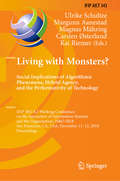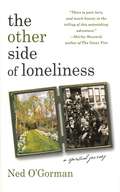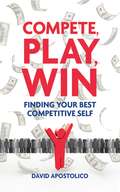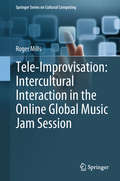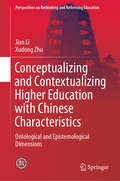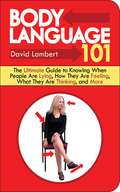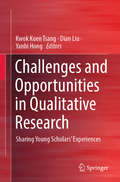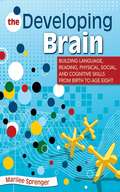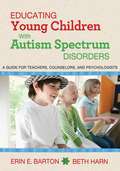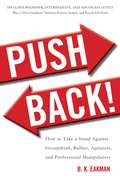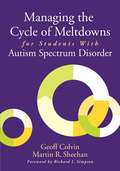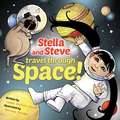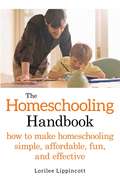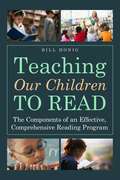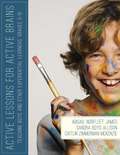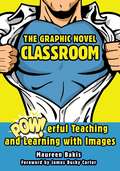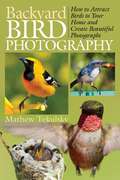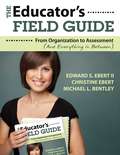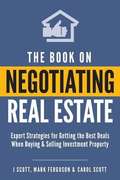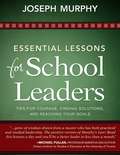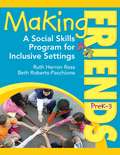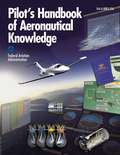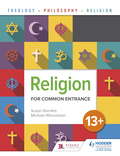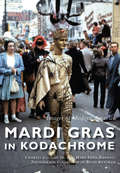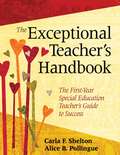- Table View
- List View
Living with Monsters? Social Implications of Algorithmic Phenomena, Hybrid Agency, and the Performativity of Technology: IFIP WG 8.2 Working Conference on the Interaction of Information Systems and the Organization, IS&O 2018, San Francisco, CA, USA, December 11-12, 2018, Proceedings (IFIP Advances in Information and Communication Technology #543)
by Ulrike Schultze Margunn Aanestad Magnus Mähring Carsten Østerlund Kai RiemerThis book constitutes the refereed proceedings of the IFIP WG 8.2 Working Conference on Information Systems and Organizations, IS&O 2018, held in San Francisco, CA, USA, in December 2018.The 11 revised full papers presented together with one short paper and 2 keynote papers were carefully reviewed and selected from 47 submissions. The papers are organized in the following topical sections: setting the stage; social implications of algorithmic phenomena; hybrid agency and the performativity of technology; and living with monsters.
The Other Side of Loneliness: A Spiritual Journey
by Ned O'GormanEvery once in a while, out of nowhere, a very special person appears with the courage and conviction to change the destiny of others. Such a person is Ned O'Gorman. Wandering in Harlem one day, Ned saw an abandoned storefront and there he met his calling and future: he would start a tuition-free school for the underprivileged.
Compete, Play, Win: Finding Your Best Competitive Self
by David ApostolicoThis book is a sociological examination of competition and the competitive drive, told from the viewpoint of a competition freak. The author explores the energy and force behind the need to compete, and what the consequence of that need is. In the chapter "Sperm Wars," Apostolico discusses conception as the beginning of the competitive nature of humans, while also discussing the competition for a mate that precedes it. Through this, he sets up the idea of a biological necessity for competition and how evolution has modified and enhanced that drive. In a later chapter called "Competitive Nature," Apostolico participates in as many competitive endeavors as possible (eating contests, drag races, dog shows, etc.) and answers a set of 10 questions about each, concluding with, "Can a competitive junkie ever truly feel satisfied?"
Tele-Improvisation: Intercultural Interaction in the Online Global Music Jam Session (Springer Series on Cultural Computing)
by Roger MillsThis research monograph explores the rapidly expanding field of networked music making and the ways in which musicians of different cultures improvise together online. It draws on extensive research to uncover the creative and cognitive approaches that geographically dispersed musicians develop to interact in displaced tele-improvisatory collaboration. It presents a multimodal analysis of three tele-improvisatory performances that examine how cross-cultural musician’s express and perceive intentionality in these interactions, as well as their experiences of distributed agency and tele-presence.Tele-Improvisation: Intercultural Interaction in the Online Global Music Jam Session will provide essential reading for musician’s, postgraduate students, researchers and educators, working in the areas of telematic performance, musicology, music cognition, intercultural communication, distance collaboration and learning, digital humanities, Computer Supported Cooperative Work and HCI.
Conceptualizing and Contextualizing Higher Education with Chinese Characteristics: Ontological and Epistemological Dimensions (Perspectives on Rethinking and Reforming Education)
by Jian Li Xudong ZhuThis book provides a fresh and unique overview of the modernization and internationalization of Chinese higher education, focusing on Chinese higher education from 1949 to 2018. It presents the Ontological Positivism Model (Conceptualization-Explicit-Formal-Share), concentrating on concepts of Chinese higher education.The book is intended for scholars and researchers in the field of comparative higher education, administrators and stakeholders in education management and graduate students majoring in higher education.
Body Language 101: The Ultimate Guide to Knowing When People Are Lying, How They Are Feeling, What They Are Thinking, and More
by David LambertThis amazing, revealing handbook contains all anyone will ever need to know about reading body language. With it, you can become a veritable human lie detector, spotting exactly when people are telling the truth, when they are lying, and even how they are feeling. What can you tell by folded arms, by the distance away someone stands when talking to you, from facial expressions, or from blinking eyes? The answer? Almost everything! With hundreds of examples illustrated in full color, Body Language 101 can help anyone from any culture know more about his or her friends, spouse, colleagues, lovers, competitors, and enemies.
Challenges and Opportunities in Qualitative Research: Sharing Young Scholars’ Experiences
by Kwok Kuen Tsang Dian Liu Yanbi HongThis book shares young scholars’ (current PhD students and those who completed their PhD between 2010 and 2015) experiences with conducting qualitative social research. Intended as a guide for newcomers to the field, it focuses on the practical issues encountered by qualitative researchers rather than methodological discussions. Accordingly, it addresses a range of representative issues in the qualitative research process – namely research design, data access, data collection, and data analysis – and covers a variety of social sciences topics.
The Developing Brain: Building Language, Reading, Physical, Social, and Cognitive Skills from Birth to Age Eight
by Marilee SprengerHow can early childhood teachers, administrators, and parents translate discoveries on early brain development into strategies that nurture cognitive growth? The key is to using the information gathered from neuroscience, cognitive psychology, and child development. The Developing Brain offers brain-compatible teaching practices for parents and teachers that are linked to principles for working with young children from the National Association for the Education of Young Children.Bestselling author Marilee Sprenger covers the basic structure, vocabulary, and current research on the brain from an early childhood educator's point of view and provides an abundance of illustrations and descriptions. This user-friendly guide includes:Background information on brain development from birth through age twoScenarios and snapshots of each year from age three through eightReproducible development checklistsOver one hundred brain-based activities for classroom or child care settingsAnd much more!Through an understanding of the phases of language, motor, and social development at each age level, The Developing Brain will help both educators and parents create an enriching educational experience that enhances a child's growth and fosters an enduring love of learning.
Educating Young Children with Autism Spectrum Disorders: A Guide for Teachers, Counselors, and Psychologists
by Beth Harn Erin E. BartonAccording to the CDC, one in fifty American children is diagnosed as having an autism spectrum disorder. This means more school-aged children are entering classrooms with ASDs and teachers are being called upon to help facilitate their learning. Educating Young Children with Autism Spectrum Disorders is aimed at providing strategies for teachers, school counselors, and psychologists to help address the needs of children on the spectrum, as well as their families. Erin E. Barton and Beth Harn draw on current research and practices to discuss the possible causes of autism and to help prepare educators not only for teaching children in the classroom but also for providing families with the tools necessary to continue the educational process at home. Included are topics such as: Improving communication and socializationDeveloping instructive lessonsAssessing students' progressIncluding families in educational goalsFinding students' special interests and using those to help facilitate learningManaging challenging behaviorAnd more Including forms, charts, and a range of classroom activities, this is the only resource you will need to gain the insight and tools for making a difference in the educational lives of young children with autism.
Push Back!: How to Take a Stand Against Groupthink, Bullies, Agitators, and Professional Manipulators
by B. K. EakmanHow many times have you had the unsettling experience of being treated as a troublemaker as soon as you question or raise an objection to a school policy, a textbook, a course of study, a new county regulation, or a community proposal?Every day, attendees of conferences, community forums, PTA meetings, and board meetings are made to feel uncomfortable and occasionally foolish by the person or persons leading the meeting. The speakers, moderators, or provocateurs-whom author B. K. Eakman refers to as professional manipulators-hold power over the room and know how to steer the discussion back to their agendas without ever answering audience questions or addressing their concerns. These people use techniques to ostracize those brave enough to stand and question or criticize them.With Push Back!, readers will be able to counter group manipulation tactics by learning to:Recognize psychologically controlled environmentsIdentify the professional agitator/provocateurExamine components of psych warUndercut faulty, distorted, and biased arguments of opponentsSquelch techniques used to rebuff audience members who complain or balkNeutralize consensus-building techniquesAnd much more
Managing the Cycle of Meltdowns for Students with Autism Spectrum Disorder
by Martin R. Sheehan Geoff ColvinBased on Geoff Colvin's bestselling book, Managing the Cycle of Acting-Out Behavior in the Classroom, this practitioner-friendly guide provides special and general education teachers of autistic students with a six-phase positive behavior support model that includes interventions for each phase. Outlining practical steps for preventing and responding to the various phases of meltdown behavior in students with autism spectrum disorder, you'll find: An overview of ASD Examples of meltdown behavior Common triggers Addressing sensory issues Establishing expectations and rules Collaborating with parents And much moreTeachers will find experienced guidance for providing a supportive environment in which students with ASD can succeed.
Stella and Steve Travel through Space!
by Bethany Straker James Duffett-SmithDid you know that Jupiter is eleven times the size of Earth? The solar system is an incredible place that is still mostly unexplored. So, when Stella and her family move to a new town-where Stella has no friends except for her dog Steve-she goes exploring. In this educational book, travel across the solar system with Stella and Steve as Stella looks for a new home on another planet and imagines what life would be like on another world, from Mercury to Pluto. But along the way Stella learns that Venus has acid rain and Neptune is made entirely of gas, and she begins to wonder whether Earth might actually be the perfect home for her after all.Featuring a fun and informational story from author James Duffett-Smith, and bold, comic book style illustrations by Bethany Straker, Stella and Steve Travel Through Space shows just how great the Earth is (while providing young children with an early science lesson) in a twist on "there's no place like home." A quirky but education book on the solar system (with slight undertones of conserving the Earth), this book for children ages 3 to 6 is sure to find a home in preschool and Kindergarten classrooms as well as home across the globe. Parents will love the science information throughout and kids will instantly connect with Stella and her suave pug Steve. Children will learn the basics about the solar system, the various planets, and why we are able to live on Earth so well.
The Homeschooling Handbook: How to Make Homeschooling Simple, Affordable, Fun, and Effective
by Lorilee LippincottThe mere thought of homeschooling can be overwhelming. What curriculum do I choose? What if we can't afford all the books? How do I schedule our time? Will my children become socially awkward recluses? What if I screw up my kids' education?! Lorilee Lippincott, a seasoned homeschooling mom, shows just how simple homeschooling can be. She and her husband taught their two kids in a one-bedroom apartment before picking up and moving the whole family to China. They've discovered that they don't need rooms full of books, educational toys, and other teaching tools, nor do they need schedules packed full of extracurricular activities, field trips, and social events. Perhaps even more importantly, they don't need to panic about making sure their kids turn out okay. It's actually all pretty simple, she tells readers.But homeschooling well does require some planning and dedication, and a book like The Homeschooling Handbook to be your guide. Here you'll find all your questions answered in Lippincott's straightforward, warm, and witty style. Topics covered include:How to instill curiosity and a love of learningTypes of homeschoolingYour socialization fears assuagedHow to create simple schedules and stick to themTips for keeping costs downTeaching kids with disabilitiesThe benefits of play timeLegal requirementsHow to avoid burnoutAnd much more!Full of anecdotes, interviews with other homeschooling families, and wisdom, this is a must-have for any family considering the homeschooling life.
Teaching Our Children to Read: The Components of an Effective, Comprehensive Reading Program
by Bill HonigStudies of effective teaching practices have continued to validate the need for explicit and systematic instruction in basic reading skills, and Bill Honig uses this research to shed new light on an old problem-how to help all students become fluent readers. Teaching Our Children to Read grows out of the experiences of scores of dedicated teachers and their success in the classroom. This book explores current research from the leading experts in the field, and presents new instructional strategies that bring all students to higher levels of literacy.Highlights from Teaching Our Children to Read include: Phonics instruction and fluency Connected practice with decodable text Multisyllabic word instruction Spelling, vocabulary, and concept development Strategic reading, book discussions, and text organization Literacy benchmarks, assessment, and interventionThis is an essential resource for educators, administrators, policymakers, and parents concerned about how to successfully teach our children to read. Teaching Our Children to Read points the way to implementing the best research-based practices in adopting reading materials, training teachers, and providing the necessary school leadership.
Active Lessons for Active Brains: Teaching Boys and Other Experiential Learners, Grades 3-10
by Caitlin Zimmerman Mckenzie Sandra Boyd Allison Abigail Norfleet JamesLearn what to do when your students' feet just can't keep still.If you have had enough of repeating yourself to students who aren't listening, try a little less talk and a lot more action. The authors of Active Lessons for Active Brains have assembled an indispensable, ready-to-use collection of mathematics, language arts, science, and classroom management strategies to focus a classroom full of energetic minds. Designed for active, hands-on learners-whether male or female-the text provides more than 70 specific lesson plans for addressing students' common challenges, already differentiated to match their experiential learning style.The many benefits of using this book include: A more orderly classroom Enhanced capacity to focus on tasks Improved retention of subject matter Increased student engagementThis book contains a wealth of examples, visuals, and material that can be easily reproduced in the classroom. Suitable for upper elementary to high school students, lesson plans can be readily adapted to suit any curriculum.
The Graphic Novel Classroom: POWerful Teaching and Learning with Images
by James Bucky Carter Maureen BakisEvery teacher knows that keeping adolescents interested in learning can be challenging-The Graphic Novel Classroom overcomes that challenge. In these pages, you will learn how to create your own graphic novel in order to inspire students and make them love reading. Create your own superhero to teach reading, writing, critical thinking, and problem solving!Secondary language arts teacher Maureen Bakis discovered this powerful pedagogy in her own search to engage her students. Amazingly successful results encouraged Bakis to provide this learning tool to other middle and high school teachers so that they might also use this foolproof method to inspire their students. Readers will learn how to incorporate graphic novels into their classrooms in order to:Teach twenty-first-century skills such as interpretation of content and formImprove students' writing and visual comprehensionCaptivate both struggling and proficient students in readingPromote authentic literacy learningDevelop students' ability to create in multiple formatsThis all-encompassing resource includes teaching and learning models, text-specific detailed lesson units, and examples of student work. An effective, contemporary way to improve learning and inspire students to love reading, The Graphic Novel Classroom is the perfect superpower for every teacher of adolescent students!
Backyard Bird Photography: How to Attract Birds to Your Home and Create Beautiful Photographs
by Mathew TekulskyFans of bird watching will rejoice with Backyard Bird Photography, a guide for learning how to set up your backyard in order to take the best photographs of your local birds. In addition to guiding you through the first steps of setting up your plantings and bird feeders, this book describes the types of photographic equipment you will need to get just the right image; how to maneuver yourself into just the right position to create a quality bird photograph; how to compose your shots for the greatest visual effect; and how to use more advanced techniques such as macro lenses and external flash techniques.Author and bird photographer Mathew Tekulsky breaks down the challenges of photographing these beautiful creatures and explains how utilizing your own natural surroundings can create stunning shots that rival those shot in the wild. Tekulsky explains that when your garden is set up as a tiny oasis for these feathered friends--with the right foliage, water sources, and feeders--then your backyard will be frequented by a variety of species on any given day. With tips for gaining the bird's trust and composition, every photograph will come out a stunner.
The Educator's Field Guide: An Introduction to Everything from Organization to Assessment
by Christine Ebert Michael L. Bentley Edward S. Ebert IIThe Educator's Field Guide helps teachers get off to a running start. The only book that covers all four key cornerstones of effective teaching-organization, classroom management, instruction, and assessment-this handy reference offers a bridge from college to classroom with a hearty dose of practical guidance for teachers who aspire to greatness. At a time when school leaders are pressed to hire and retain high-quality teachers, this guidebook is indispensable for defining and nurturing the qualities the qualities teachers strive for and students deserve. Helpful tools include:Step-by-step guidance on instructional organization, behavior management, lesson planning, and formative and summative assessmentUser-friendly taxonomic guides to help readers quickly locate topicsThe latest information on student diversity, special needs, and lesson differentiationTeacher testimonials and examplesExplanations of education standards and initiativesEach key concept is addressed in a resource-style format with activities and reproducible that can be customized. Teachers will also find lesson plan templates, graphs, charts, quizzes, and games-all in one easy-to-use source.
The Book on Negotiating Real Estate: Expert Strategies for Getting the Best Deals When Buying & Selling Investment Property,
by J Scott Mark Ferguson Carol ScottThe principles behind successful negotiation, The psychology of building relationships to gain negotiating leverage, How to uncover and use information to tip negotiating outcomes in your favor, Strategies for defining optimal offers and counter-offers, Tactics for in-the-trenches negotiating and overcoming objections, Strategies for using concessions to get your deal to the finish line, Tips for overcoming tactics employed by those on the other side, How to overcome the challenges of making/receiving offers through agents, Tactics to renegotiate issues that arise from contract contingencies, Strategies to get the best of it when buying properties from banks and HUD.
Essential Lessons for School Leaders: Tips for Courage, Finding Solutions, and Reaching Your Goals
by Joseph MurphyThis gold mine of wisdom from top education researcher and the bestselling author of Turning Around Failing Schools and Connecting Teacher Leadership and School Improvement contains key tips and strategies every school leader should know. Award-winning professor and former school administrator Joseph Murphy's concise and instructive lessons will help you stay focused on what matters most as you navigate the hectic world of high-stakes testing and accountability: It really is all about the kids Optimism is essential Caring counts a lot Listen-let people finish talking Don't confuse excuses and explanationsEach lesson is coupled with context in a few sentences taken from Murphy's extensive real-world experiences. This collection is ideal for use in daily reflections, speeches, staff meetings, presentations, or as a gift to anyone who works with children.
Making Friends PreK3: A Social Skills Program for Inclusive Settings
by Beth Roberts-Pacchione Ruth Herron RossResearch shows that a child's social and behavioral skills affect the development of cognitive and physical abilities. Set students on a path to success and have fun doing it with this newly retitled edition of the popular Wanna Play. The authors provide hundreds of activities that help children learn how to behave appropriately and make friends. Included are tools for teaching emotion regulation, team playing, and body safety to all children, making this resource ideal for use in inclusive settings. New features include: A social interaction checklist for identifying learners' strengths and weaknesses Teacher-friendly activities that can be used in small groups or with the whole class A chapter on teaching emotions and communication skillsStudents with social challenges benefit from direct instruction, and early intervention helps prevent behavior problems and pave the way to academic success. This hands-on guidebook gives teachers, counselors, behavior therapists, and caregivers a wealth of easily implemented and fun-filled ways to enhance children's skills in all areas of social interaction.
Pilot's Handbook of Aeronautical Knowledge: Faa-h-8083-25, December 2003 (FAA Handbooks Ser.)
by Federal Aviation AdministrationPilot's Handbook of Aeronautical Knowledge, created by the Federal Aviation Administration, is the official reference manual for pilots at all levels. An indispensable and invaluable encyclopedia, it deals with all aspects of aeronautical information.Each chapter focuses on a different area that pilots are tested on in flight school and must need to know before they fly a plane on of their own. These topics include:aircraft structureprinciples of aerodynamicsflight controlsaircraft systemsflight instrumentsand moreFlight manuals and documentation are also covered, as is specialized information on such matters as weight and balance, aircraft performance, weather, navigation, airport operations, aeromedical factors, and decision-making while flying. An updated appendix, detailed index, and full glossary make this book easy to navigate and useful in quick reference situations.
Religion for Common Entrance 13+
by Susan Grenfell Michael WilcocksonTrust the experts; let Religious Studies specialists Susan Grenfell and Michael Wilcockson guide you through the new World Religions content of the 2018 ISEB Theology, Philosophy and Religion syllabus for Common Entrance 13+.- Enables students to develop and review their knowledge through discussion points and a variety of activities designed to encourage active research and engagement- Builds the skills that students need for the exam by providing questions that focus on the three assessment objectives- Boosts students' confidence approaching assessment with exam-style practice questions at the end of each section- Offers a flexible route through the new syllabus with clear coverage of all six world religionsThis Student Book is fully supported by the accompanying Teacher Resource Book, which contains helpful Teachers' Overviews for each chapter, guidance on delivering the content and classroom-ready worksheets.
Mardi Gras in Kodachrome (Images of Modern America)
by Charles Cassady Jr. Mary Lynn Randall Ruth KetchamAmerica's greatest party and America's most colorful city, in all their shades, shimmer here in a never-before-published 1950-1960 collection of photographs taken at New Orleans's annual Mardi Gras. Photographer Ruth Ketcham chose the revolutionary Kodachrome slide film to capture Carnival, its walking and parading krewes, bystanders, and masquers. Kodachrome's fade-resistant images preserve a bygone 1950s era, not only of Mardi Gras but also of a bustling French Quarter, alive again with Regal Beer ("Red beans and rice / And Regal on ice"), Dixieland jazz clubs, the burlesque dancers and temptations of Bourbon Street, and the shopper's paradise that was Canal Street.
The Exceptional Teacher's Handbook: The First-Year Special Education Teacher?s Guide to Success
by Alice B. Pollingue Carla F. SheltonThe first year in the career of a special education teacher is filled with expectation and promise. Addressing the most common needs of beginning special education teachers, The Exceptional Teacher's Handbook helps new educators move confidently from preplanning to post-planning for the entire school year.The authors present a step-by-step management approach complete with planning checklists and other ready-to-use forms within the context of IDEA 2004 and NCLB. Written from the perspective of a classroom teacher, this popular reference offers updates on:* Recognized disabilities* Best instructional practices for getting the most out of your students* Successful parent conferences* Effective plans for professional learning* Alternate assessments, emergencies in the school setting, education terminology, and moreActively address challenges and concerns with this one-stop handbook that will help smooth the transition from student teacher to professional educator.
